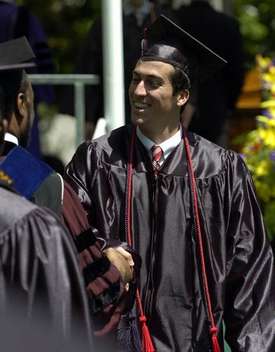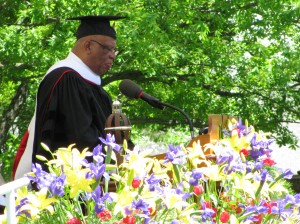When my son was in the 8th grade I had the privilege of preparing and coaching the graduation speakers of Kent Middle School in Kentfield, California. The speakers were terrific, and those speeches were everything a good graduation speech should be: personal, hopeful, reflective, inspiring, cautionary and funny. They were also well organized with a beginning, middle and end, and they were filled with personal stories, metaphors, quotes and vivid imagery. They were well prepared, rehearsed in advance and most important, designed with the audience in mind. Each speaker had a message that was carefully prepared for their classmates and their families.
It’s hard to believe, but those 8th graders from Kent Middle School are graduating from college this year. Among them is my son, Jonathan. So in a few days, I will be listening to a commencement speech firsthand. My son will graduate from Denison University in Granville, Ohio. So it gives me pause to reflect on the commencement speech during this personally momentous graduation season.

Jonathan Lydon / photo by Blide
The commencement speech is a social milestone. It is one traditional rite of passage that shares the same level of cultural significance as the first haircut, the driver’s license, and the high school prom. In the next few weeks, commencement speeches will be delivered to hundreds of thousands of spectators at approximately 4,100 colleges and 37,000 high schools in the United States, not to mention middle and elementary schools. Now consider those numbers on a global scale. It is quite astounding!
These orations celebrate achievement, foster hope in the face of adversity and offer the challenge to lead. They often provide moments of reflection or the cautionary tale, with the hope that students will learn from the speaker’s mistakes. Like any address, the styles of commencement speeches vary from humorous to heartbreaking.
Regardless of content and style, there are 10 key ingredients that make up a successful commencement address. Whether you are giving the commencement address or are one of thousands of listeners sitting in the gymnasium or outside in the academic quad, pay attention to the following points, as they are the best practices of commencement speeches.

Orlando L. Taylor / photo by Jonathan Nolan
· Use a simple “open, body, close” content structure. This was the way Aristotle did it, so why not follow the master. It works.
· Use the power of three: “Today I’m going to share three of my favorite mistakes… or three stories… or three lessons…” This formula is simple to construct and easy for the listeners to understand.
· Use a quote to provide “bookends” to the address (that is, use it when you open and when you close). Something as simple as the James Joyce quote, “Mistakes are portals of discovery,” is a good example.
· Fill your speech with other rhetorical devices, including metaphors, anecdotes, examples, quotes, rhetorical questions, vivid imagery and especially humor.
· Tell your personal story. The audience is waiting to hear this. It is expected and desired. It is your story that will stick long after the speech is over.
· Focus on your audience. This is not just a group of hung over, tuned out and misunderstood Gen Y “kids.” This is also a group of idealists longing for direction and wisdom.
· Your delivery must be bigger physically and vocally than a simple conversation. Use a strong and loud voice, speak slowly, pause often, be dramatic and remember to give the audience a chance to respond to your comments and jokes.
· Whatever you do, don’t read your notes verbatim! Reading is tedious and boring. You will put even the most well intentioned audience to sleep. Memorize your speech if it is short or organize in such a way that you can speak comfortably from an outline without getting lost.
· Smile as if you really mean it. Let them know how honored you feel to be speaking to them at this momentous occasion in their lives.
· Remember this is a day of celebration. End on a high note; ask your audience to take action: “Today I ask you to go out there and…” Tell them that you know they can do it… and they will.





May 15th, 2009 at 6:02 am
Here’s the original funny graduation speech (delivered 20 years ago):
http://www.youtube.com/watch?v=kUEkwwZYb3E